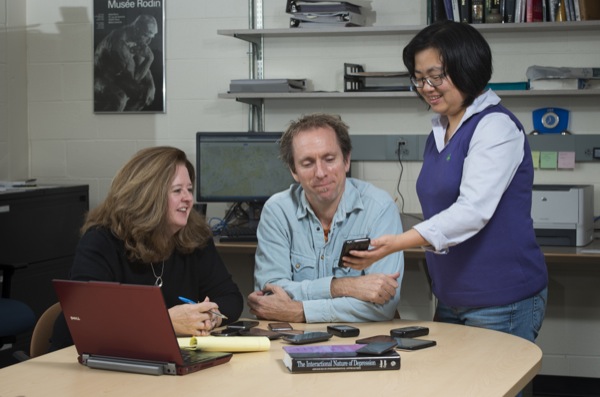
UDRF grants awarded
Five teams win UD Research Foundation strategic initiatives funding
4:02 p.m., Dec. 10, 2012--Can acoustic sensors serve as a new research tool for monitoring ice cover in the rapidly changing Arctic? Will eating soy food help prevent prostate cancer?
The latest recipients of University of Delaware Research Foundation (UDRF) Strategic Initiative grants will be addressing these and other important questions.
Research Stories
Chronic wounds
Prof. Heck's legacy
UDRF is a nonprofit, tax-exempt organization that supports fundamental research in all fields of science. Although an independent corporation, it is chartered primarily to support the University of Delaware’s research mission.
UDRF’s Strategic Initiatives grants program was established in 2008 to support research in areas emphasized in the University’s Path to Prominence strategic plan, including life and health sciences, energy and environment; and an additional priority area of national security and defense. The Research Office administers the grants program.
“While seeding projects in high-priority research areas, strategic initiatives grants emphasize the pairing of a burgeoning faculty member with a senior mentor to support the early career development for the former,” says Charlie Riordan, vice provost for research. Each of the five funded teams includes an early-career, untenured, tenure-track faculty member and at least one tenured faculty member as collaborator and mentor.
“Mentoring by established and successful researchers aids early-career faculty in areas ranging from project development and implementation, to student mentoring, to knowledge dissemination through publications. These efforts position our new faculty to be more competitive in securing external funding,” Riordan notes.
Funded projects
Each award, totaling $45,000, includes $17,500 from UDRF, which is matched by $17,500 from the Research Office, $5,000 from the provost and $5,000 from the early-career researcher’s college dean.
Smartphone-Based Treatment Enhancement for Clinical Depression. Hui Fang, assistant professor of electrical and computer engineering, working with mentors Stephan Bohacek in electrical and computer engineering and Adele Hayes in psychology, will pioneer the use of smartphones to monitor risk factors and symptoms of depression. The research will develop data collection and fusion techniques to monitor a wide range of mental health factors over four domains, including lifestyle, emotion and emotion regulation, beliefs and interpersonal functioning.
Next Generation Intermolecular Potentials for Virtual Drug Discovery: Application to Lead Development for Parkinson’s Disease. Edward Lyman, assistant professor, working with mentor Krzysztof Szalewicz, both in physics and astronomy, will explore advanced molecular simulation methods that have the potential to dramatically impact the process of drug discovery by performing virtual “experiments” to calculate the affinity of putative drug molecules for target proteins. The team will use symmetry adapted perturbation theory based on density functional theory to improve the predictive accuracy of such calculations.
Role of Matrix Metalloproteinase 9 in the Spatial Redistribution of Bone Marrow Blood Vessels during Parathyroid Hormone-Induced Bone Remodeling. Growing evidence links vascular disease with impaired skeletal health and osteoporosis, the loss of bone mass that leaves its victims at increased risk of bone fractures. Rhonda Prisby, assistant professor of kinesiology and applied physiology, working with mentor Randall Duncan in biological sciences, will examine the distance between bone marrow blood vessels and active bone-forming sites as a function of age, as well as the impact of therapies to reduce that distance.
Acoustic Communication for Monitoring the Arctic Interior. Obtaining accurate predictions for ice coverage and thickness in the rapidly changing Arctic is difficult, much due to the scarcity of observations. Aijun Song, assistant professor, working with mentor Mohsen Badiey, both in physical ocean science and engineering, will test an acoustic sensing strategy for monitoring remote Arctic oceanographic regions more reliably and cost-effectively. The research will build a pair of acoustic modems for under-ice deployment and long-range telemetry and test them at sites in Canada and Norway in collaboration with international partners.
Is Soy Food Good for the Prevention of Prostate Cancer? Prostate cancer is the second leading cause of cancer death in American men. Epidemiologic evidence and laboratory studies suggest that soy products or soy isoflavones (compounds with hormonal effects) might reduce prostate cancer risk. However, concerns also have been raised about negative health effects of soy overconsumption. Changqing Wu, assistant professor of animal and food sciences, working with mentors Robert Sikes in biological sciences and Carl Schmidt in animal and food sciences, will investigate the potential impact of dietary soy on prevention or progression of prostate cancer.
Article by Tracey Bryant
Photo by Kathy F. Atkinson








